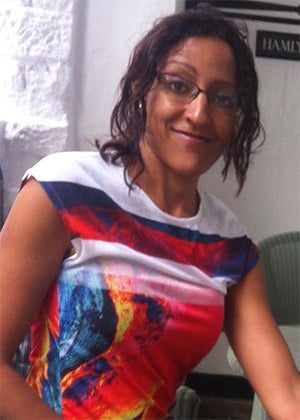HPS Professor Mazviita Chirimuuta Sets Her Sights on Solving the Puzzle of Color
 As anyone who has ever painstakingly pored over a paint chip wall at a home improvement store—only to bring home a gallon of useless paint—knows, color can be elusive. Your home’s lighting, the time of day, accompanying furniture and fabrics, and more all play key roles in how you will perceive the color at home, which is typically quite different than you will in a huge, fluorescent-lit warehouse.
As anyone who has ever painstakingly pored over a paint chip wall at a home improvement store—only to bring home a gallon of useless paint—knows, color can be elusive. Your home’s lighting, the time of day, accompanying furniture and fabrics, and more all play key roles in how you will perceive the color at home, which is typically quite different than you will in a huge, fluorescent-lit warehouse.
This does not surprise Mazviita Chirimuuta.
“Colors don’t ‘belong’ to objects independently of our perceptions, nor are they just made up in our heads,” she explains. “Colors come about because of a specific interaction between ourselves and our surroundings, known as vision.”
An assistant professor in the Dietrich School’s Department of History and Philosophy of Science, Chirimuuta has been studying color and vision since her undergraduate days at the University of Bristol in England, and she has been fascinated with these concepts for even longer.
As a child growing up in England, she recalls pausing to look at a patch of concrete. Part of it lay in shade, and part did not. The color appeared different, depending upon the shading. “What is the true color of the ground?” she remembers asking herself. She did not find a simple answer. She probed further at home, asking her mother (who is an ophthalmologist) how sight works. She found out the retina projects images upside down, and she wondered why the world did not look upside down too.
Chirimuuta takes a sophisticated look at her childhood questions and more in her recently published book, Outside Color: Perceptual Science and the Puzzle of Color in Philosophy.
In the book, she explores the roots of the philosophical debate over color—which reach back to the 17th century and before—offering an overview of philosophy’s approach to the problem of color. Chirimuuta then draws upon contemporary perceptual science and recent findings in neuroscience and vision science to tackle complex questions. Is color real or illusory? Is color mind-independent or mind-dependent? Does seeing in color give us a true picture of external reality?
In a spring interview with the science magazine Nautilus, she explained her view: “There are perceptual processes going on all the time. Every time I look around a room, light’s bouncing off the walls into my eyes, and my brain is processing this information. That whole extended interaction between myself and my surroundings—that’s the thing that has color, not the object I see.”
Chirimuuta has taught at Pitt since Fall 2011; prior to joining the faculty at the Dietrich School, she completed post-docs the world over, from the Pisa Vision Lab in Italy to the Monash University School of Philosophy in Australia; from McGill University in Montreal to Washington University in St. Louis. She earned her degrees in her home country of England, with a BSc in Philosophy and Psychology from the University of Bristol and a PhD in Physiology from the University of Cambridge.
At Pitt, Chirimuuta teaches both graduate and undergraduate courses, ranging from the Philosophy of Science and Artificial Intelligence to Methods and Interpretations in Cognitive Neuroscience.
Her current graduate seminar, Central Problems in Systems Neuroscience, works through today’s debates in the philosophy of neuroscience about how different models of brain systems offer varying explanations of brain functions.
“I’m particularly interested in the way scientists and modelers deal with the phenomenal complexity of the brain and try to capture the essential features of neural activity which make vision, for example, possible,” says Chirimuuta.
The seminar’s theme, “How to Simplify the Brain,” is something she hopes to explore in depth, as the topic of her next book. The science is changing so rapidly in this area, Chirimuuta has to update her classes each time she teaches them.
“I only retained one reading this year from the past syllabus,” she says. “It keeps things interesting.”
Chirimuuta enjoys delving into her areas of expertise with in-depth, focused classes, but also stepping back when she teaches broader courses, such as General Philosophy of Science, that ground her with their exploration of big-picture questions: “I have the luxury of teaching material which really fascinates me in all of my classes.”
